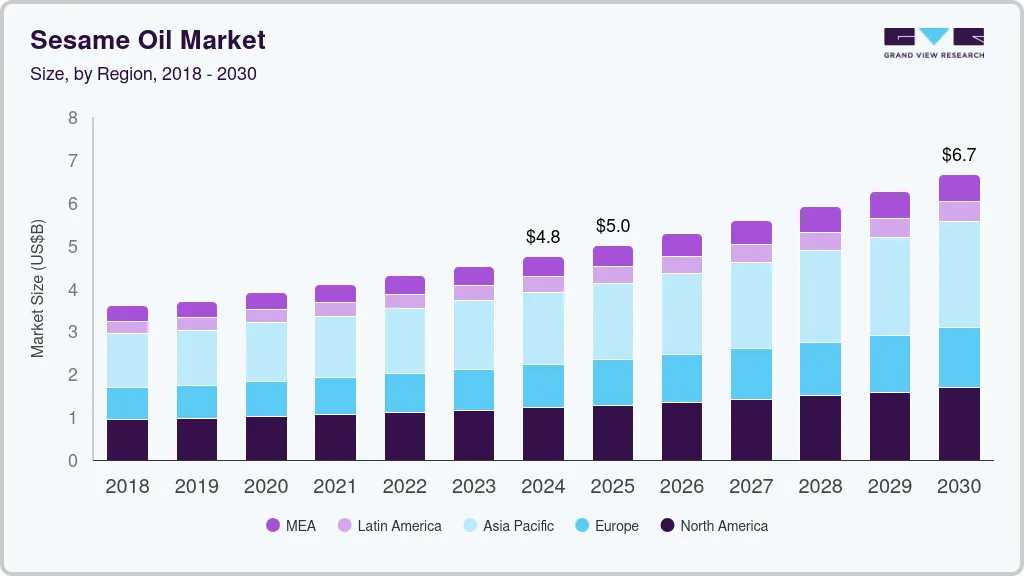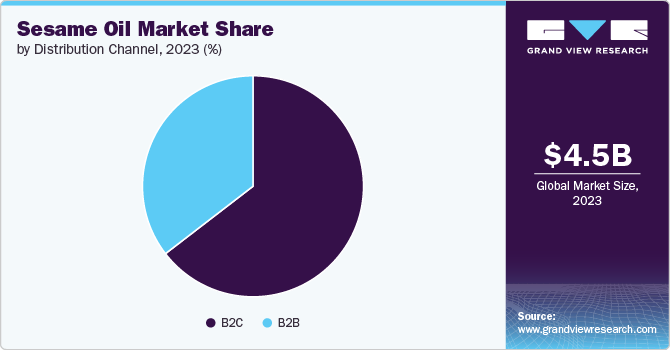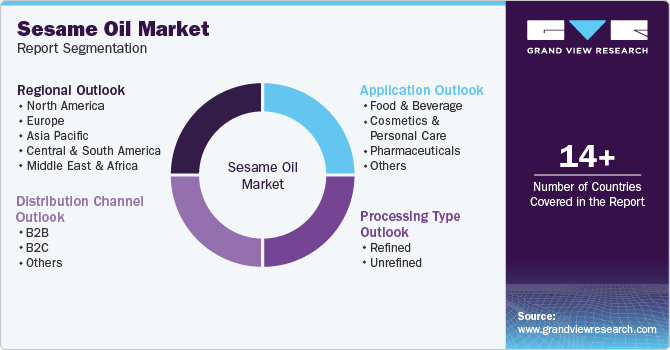- Home
- »
- Consumer F&B
- »
-
Sesame Oil Market Size, Share, Growth, Trends Report 2030GVR Report cover
![Sesame Oil Market Size, Share & Trends Report]()
Sesame Oil Market (2024 - 2030) Size, Share & Trends Analysis Report By Processing Type (Refined, Unrefined), By Application (Food & Beverage, Cosmetics & Personal Care, Pharmaceuticals), By Distribution Channel (B2B, B2C), By Region, And Segment Forecasts
- Report ID: GVR-4-68040-433-3
- Number of Report Pages: 80
- Format: PDF
- Historical Range: 2018 - 2023
- Forecast Period: 2024 - 2030
- Industry: Consumer Goods
- Report Summary
- Table of Contents
- Segmentation
- Methodology
- Download FREE Sample
-
Download Sample Report
Sesame Oil Market Summary
The global sesame oil market size was estimated at USD 4.52 billion in 2023 and is projected to reach USD 6.67 billion by 2030, growing at a CAGR of 5.8% from 2024 to 2030. The demand and consumption of sesame oil are increasing globally due to a combination of health trends, culinary interests, and expanding applications across various industries.
Key Market Trends & Insights
- North America sesame oil market accounted for a revenue share of 25.8% in 2023.
- The sesame oil market in the U.S. is growing.
- By processing type, refined sesame oil accounted for a revenue share of 80.2% in 2023.
- By application, food & beverage accounted for a revenue share of 62.5% in 2023.
- By distribution channel, sales through B2B channels accounted for a revenue share of 53.2% in 2023.
Market Size & Forecast
- 2023 Market Size: USD 4.52 Billion
- 2030 Projected Market Size: USD 6.67 Billion
- CAGR (2024-2030): 5.8%
- North America: Largest market in 2023
- Asia Pacific:Fastest growing market
One of the primary drivers is the growing consumer focus on health and wellness. Sesame oil is rich in antioxidants, healthy fats, vitamins, and minerals, which contribute to its reputation as a health-promoting oil. Its anti-inflammatory properties and benefits for heart health make it a popular choice among health-conscious consumers. Additionally, as more people seek natural and organic products in their diets and personal care routines, sesame oil has become a preferred choice due to its clean, natural profile free from chemical additives.
Culinary trends also significantly influence the rising demand for sesame oil. The globalization of food culture has led to a surge in the popularity of Asian cuisines, such as Chinese, Japanese, Korean, and Indian, where sesame oil is a staple ingredient. The distinct flavor and versatility of sesame oil, suitable for everything from stir-frying to dressings, make it a valuable addition to both home and professional kitchens. As consumers become more adventurous in their cooking and seek authentic flavors, the use of sesame oil in various dishes has expanded beyond traditional Asian markets to a global audience.
The cosmetics and personal care industries have also contributed to the growing sesame oil market. Known for its moisturizing, anti-aging, and skin-soothing properties, sesame oil is increasingly used in skincare and haircare products. The rising demand for natural and organic ingredients in personal care has boosted its popularity in these segments. Additionally, sesame oil’s long-standing use in traditional medicine systems like Ayurveda for its therapeutic properties aligns with the growing interest in holistic and natural wellness practices.
Moreover, the pharmaceutical industry utilizes sesame oil as a carrier oil due to its ability to enhance the absorption of fat-soluble compounds and its stability, further driving its demand. Increased awareness of sesame oil’s health benefits, coupled with wider distribution networks and availability through online platforms, have made it more accessible to consumers worldwide. The market is also benefiting from a shift towards sustainable and ethical sourcing, appealing to environmentally conscious consumers. All these factors, from health benefits and culinary versatility to its role in personal care and pharmaceuticals, are driving the expansion of the sesame oil market globally.
Processing Type Insights
Refined sesame oil accounted for a revenue share of 80.2% in 2023. It is known for its high content of antioxidants, healthy fats (like omega-6 fatty acids), vitamins, and minerals, which contribute to overall health. It is also free from trans fats and cholesterol, making it a healthier option compared to other refined oils. Consumers are becoming more health-conscious and are looking for cooking oils that offer both taste and health benefits, leading to increased demand for refined sesame oil.
Unrefined sesame oil market is expected to grow at a CAGR of 6.2% from 2024 to 2030. Unrefined sesame oil is minimally processed, retaining more of its natural nutrients, including vitamins, minerals, and antioxidants like sesamol and sesamin. These compounds are believed to offer health benefits, such as improved heart health and anti-inflammatory properties. As consumers become more health-conscious, there is a growing preference for oils that are less processed and retain their natural health benefits.
Application Insights
Food & beverage accounted for a revenue share of 62.5% in 2023. As global culinary trends continue to embrace ethnic and fusion cuisines, there is an increased demand for authentic ingredients like sesame oil. It is a staple in many Asian dishes, including Korean, Chinese, Japanese, and Indian cuisines, where it is valued for its distinct nutty flavor. As these cuisines gain popularity worldwide, especially in food service and restaurants, the demand for sesame oil as a key ingredient also rises.As a result, more food and beverage manufacturers are incorporating sesame oil into their products to cater to health-conscious consumers seeking nutritious ingredients.
Pharmaceutical is expected to grow at a CAGR of 7.1% from 2024 to 2030. Sesame oil is valued for its natural therapeutic properties, such as its anti-inflammatory, antibacterial, and antioxidant effects. These properties make it a beneficial ingredient in topical treatments for skin conditions like eczema, psoriasis, and wounds. It is also used in traditional medicine systems, such as Ayurveda, for its purported benefits in treating ailments and promoting overall health. The increasing interest in natural and complementary therapies within the pharmaceutical sector has boosted the use of sesame oil.
Distribution Channel Insights
Sales through B2B channels accounted for a revenue share of 53.2% in 2023. B2B channels often offer sesame oil in larger quantities at wholesale prices, making it cost-effective for businesses such as restaurants, food manufacturers, and cosmetic companies that require sesame oil in bulk. Buying in bulk through B2B channels helps these businesses reduce their per-unit cost, manage their inventory more effectively, and maintain a steady supply without frequent reordering.

Sales of sesame oils through B2C are expected to grow with a CAGR of 5.9% from 2024 to 2030. B2C channels, such as supermarkets, grocery stores, and online retail platforms, offer the convenience of purchasing sesame oil along with other household items in one place. Consumers can easily access these channels for their daily shopping needs, making it simple to buy sesame oil without the need for bulk purchases or business accounts. Online platforms, in particular, provide the added convenience of home delivery, which is appealing to consumers looking for easy and quick access to products.
Regional Insights
North America sesame oil market accounted for a revenue share of 25.8% in 2023. With a growing focus on health and wellness, North American consumers are increasingly seeking out natural and nutritious oils for cooking and food preparation. Sesame oil is rich in antioxidants, healthy fats, vitamins, and minerals, which align with the preferences of health-conscious individuals. Its reputation as a heart-healthy oil with anti-inflammatory properties makes it an attractive choice for those looking to improve their diet with healthier cooking oils.
U.S. Sesame Oil Market Trends
The sesame oil market in the U.S. is growing. There is a growing awareness among U.S. consumers about the nutritional benefits of sesame oil, including its high levels of unsaturated fats and antioxidants such as sesamol and sesamin. These nutrients are associated with various health benefits, such as improved heart health and reduced inflammation, which resonate well with consumers who are more educated and concerned about their dietary choices.
Asia Pacific Sesame Oil Market Trends
Asia Pacific sesame oil market is expected to grow at a CAGR of 6.4% from 2024 to 2030. Sesame oil has long been a staple in many Asian cuisines, such as Chinese, Japanese, Korean, and Indian. It is widely used for its distinct flavor in a variety of traditional dishes, from stir-fries and marinades to salads and sauces. As a fundamental ingredient in these culinary traditions, the cultural preference for sesame oil remains strong, and its consumption continues to grow with the rising popularity of authentic cooking at home and in restaurants across the region.
Europe Sesame Oil Market Trends
Sesame oil market in Europe is expected to grow at a CAGR of 6.0% from 2024 to 2030. The rise of veganism and plant-based diets across Europe has led to increased interest in oils that are suitable for vegetarian and vegan cooking. As plant-based and versatile, Sesame oil is a popular choice among those following these dietary preferences. Its ability to enhance the flavor of plant-based dishes and provide essential nutrients makes it a favored ingredient in vegan and vegetarian cooking.
Key Sesame Oil Company Insights
The sesame oil market is characterized by dynamic competitive dynamics shaped by a combination of factors, including product innovation, regional production capabilities, and evolving consumer preferences. Leading manufacturers invest in R&D and technological advancements to provide cost-effective and quality products.
Market players are entering into joint ventures, partnerships, mergers, agreements, and acquisitions to strengthen their market position and expand their geographical reach. Companies are also focusing on raising consumer awareness of the ambiguity of the types used while strictly adhering to international regulatory standards.
Key Sesame Oil Companies:
The following are the leading companies in the sesame oil market. These companies collectively hold the largest market share and dictate industry trends.
- Kadoya Sesame Mills Inc.
- Wilmar International Limited
- TAKEMOTO OIL & FAT CO., LTD.
- Borges International Group
- Henan Dingzhi Agricultural Processing Types Co., Ltd.
- V.V. Vanniyom Oil Industries
- Kevala International LLC
- La Tourangelle, Inc.
- Pansari Group
- Dipasa Group
Recent Developments
-
In May 2021, Momofuku, the popular restaurant group, launched a new line of pantry staples called Momofuku Goods. The initial release includes a Toasted Sesame Oil and a Liquids Starter Pack. The Toasted Sesame Oil is made from high-quality sesame seeds that are slowly toasted to develop a rich, nutty flavor. It can be used for cooking, drizzling, or as a finishing oil.
Sesame Oil Market Report Scope
Report Attribute
Details
Market size value in 2024
USD 4.75 billion
Revenue forecast in 2030
USD 6.67 billion
Growth rate (Revenue)
CAGR of 5.8% from 2024 to 2030
Historical data
2018 - 2023
Forecast period
2024 - 2030
Quantitative units
Revenue in USD Million, and CAGR from 2024 to 2030
Report coverage
Revenue forecast, company ranking, competitive landscape, growth factors, and trends
Segments covered
Processing type, application, distribution channel, region
Regional scope
North America; Europe; Asia Pacific; Central & South America; Middle East & Africa
Country scope
U.S.; Canada; Mexico; Germany; U.K.; France; Italy; Spain; China; Japan; India; Australia & New Zealand; South Korea; Brazil; South Africa
Key companies profiled
Kadoya Sesame Mills Inc.; Wilmar International Limited; TAKEMOTO OIL & FAT CO. LTD.; Borges International Group; Henan Dingzhi Agricultural Processing Types Co. Ltd.; V.V. Vanniyom Oil Industries; Kevala International LLC; La Tourangelle; Inc.; Pansari Group; Dipasa Group
Customization scope
Free report customization (equivalent up to 8 analysts working days) with purchase. Addition or alteration to country, regional & segment scope.
Pricing and purchase options
Avail customized purchase options to meet your exact research needs. Explore purchase options
Global Sesame Oil Market Report Segmentation
This report forecasts revenue growth at the global, regional, and country levels and provides an analysis of the latest industry trends and opportunities in each of the sub-segments from 2018 to 2030. For this study, Grand View Research has segmented the global sesame oil market report based on processing type, application, distribution channel, and region.

-
Processing Type Outlook (Revenue, USD Million, 2018 - 2030)
-
Refined
-
Unrefined
-
-
Application Outlook (Revenue, USD Million, 2018 - 2030)
-
Food & Beverage
-
Cosmetics & Personal Care
-
Pharmaceuticals
-
Others
-
-
Distribution Channel Outlook (Revenue, USD Million, 2018 - 2030)
-
B2B
-
B2C
-
Hypermarkets & Supermarkets
-
Convenience Stores
-
Online
-
Others
-
-
-
Regional Outlook (Revenue, USD Million, 2018 - 2030)
-
North America
-
U.S.
-
Canada
-
Mexico
-
-
Europe
-
Germany
-
UK
-
France
-
Italy
-
Spain
-
-
Asia Pacific
-
China
-
Japan
-
India
-
Australia & New Zealand
-
South Korea
-
-
Central & South America
-
Brazil
-
-
Middle East & Africa
-
South Africa
-
-
Frequently Asked Questions About This Report
b. The global sesame oil market size was estimated at USD 4.52 billion in 2023 and is expected to reach USD 4.75 billion in 2024.
b. The global sesame oil market is expected to grow at a compounded growth rate of 5.8% from 2024 to 2030 to reach USD 6.67 billion by 2030.
b. Refined sesame oil accounted for a market share of 80.2% in 2023. There is a rising interest in Asian cuisines worldwide, where sesame oil is commonly used for its flavor and cooking properties. Refined sesame oil is particularly popular in countries like China, Japan, Korea, and India. The globalization of food culture and the increasing availability of Asian ingredients in international markets have led to higher consumption of refined sesame oil.
b. Some key players operating in sesame oil market include Kadoya Sesame Mills Inc., Wilmar International Limited, TAKEMOTO OIL & FAT CO., LTD., Borges International Group, and others.
b. Key factors that are driving the market growth include rising processed food consumption among consumers and increasing health consciousness among consumers
Share this report with your colleague or friend.
Need a Tailored Report?
Customize this report to your needs — add regions, segments, or data points, with 20% free customization.

ISO 9001:2015 & 27001:2022 Certified
We are GDPR and CCPA compliant! Your transaction & personal information is safe and secure. For more details, please read our privacy policy.
Trusted market insights - try a free sample
See how our reports are structured and why industry leaders rely on Grand View Research. Get a free sample or ask us to tailor this report to your needs.










